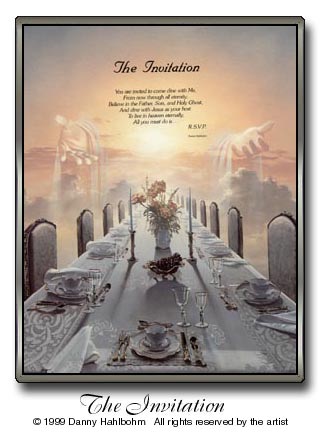|
||||||||||
Many are Called but Few are Chosen
John R Gavazzoni
January 28, 2003
Thousand Oaks, CA
Editor's Note: This essay is John's reply to a question asked by a brother. Jan Antonsson.
Hi Greg (not his real name),
I'm finally getting back to you on your question about Jesus' statement, "For many are called, but few are chosen" (Matt. 22:14). I shared your question with some brethren whose opinion I value. My friends brought out the fact that those words of Jesus are really only to be found in Matt. 22. Their inclusion in the KJV in Matt. 20:16, is an unwarranted addition by the KJV translators. So, we only need to address ourselves to the parable in that one chapter.
First, let us establish that the parable has nothing directly to do with the eternal destiny of individuals and there is no valid reason to read the superstition of eternal torment into verse 13: "Then the king said to the attendants, 'Bind him hand and foot, and cast him into the outer darkness; there men will weep and gnash their teeth'" (Matt. 22:13, RSV). The parable is quite explicitly and forcefully directed at the high priests and the Pharisees, the force of it being obvious to them, that they, whose lives and "ministries" were devoted to disqualifying others from the kingdom of God, were, themselves, found to be despising that which is at the heart of God's kingdom, the delight of the Father's delight that His Son has found a bride and His desire that all He has chosen should join Him in joyous celebration.
The concept of Israel as the wife of Yahweh was not foreign to them at all and they had a shallow, surface confidence that their attention to the minutia of the law qualified them to have a place in that marriage.
But Jesus attacks their confidence with righteous indignation and brings them face to face with what lay beneath their facade of assurance: deep-seated spiritual insecurity. They were men of the law, and thus they were men who lived with the specter of the law's condemnation hovering over them constantly.There is a coloring about this whole parable that says, "Your disrespect and even hatred toward my invitation is rooted in your complete ignorance of the place that the Love, which seeks union, has in my economy." Please note that they are called "unworthy" (Vs. 8) and then compare that with what Paul and Barnabas said to the Jews who were resistant and adversarial to the good news of God's grace in Christ. I speak of Acts 13:46, "And Paul and Barnabas spoke out boldly and said, "It was necessary that the word of God should be spoken to you (the Jews) first; since you repudiate it, and judge yourselves unworthy of eternal life, behold, we are turning to the Gentiles'."
Men's unworthiness in regard to participation in the "marriage of the Lamb" is rooted in their own judgment of themselves as unworthy. Their whole religiously invented persona is an attempt to create a life of law-works that will speak back to them and say, "You're really all right, you know."
Their religious confidence is only skin-deep, and any slave-messenger who brings them the invitation to take part in the marriage celebration is despised because the message he brings is one that speaks of an extravagant, overflowing love that calls us to participation and celebration. At any given point, when one has too much invested in self-righteousness, such an invitation will not be good news to them.
Again, speaking of the "coloring" of this parable, we find that the story drips with the kind of delight in love that the person whose life, so deprived of such love, and thereby reduced to and represented by, total preoccupation with tending to his own farm and his own business (vs. 5) would find irritating and intimidating.
The atmosphere between the lines of the story is, "Big deal, so His Son is getting married and He wants to celebrate; who needs it? I've got things to do and it makes me mad that He expects me to get excited about it. In fact, it makes me so mad I'll kill those slave-messengers if they come around again telling me to come the affair."
To the crux of your question: "Why bother inviting all if all are not going to respond to the invitation? Certainly God knows if we will or not. And is it our choice of saying, "Yes" or "No," that finally determines if we're chosen?" Does this statement of Jesus support the notion that, in the final analysis, it is we who choose to be chosen?
In the story, the King obviously wanted the first group of people to come, so will their refusal deprive Him of His desire? Or, will their refusal become part of the complex of His workings, by which He makes it clear that an invitation alone won't bring about the desired response as long as there is no appreciation of the spirit of the invitation and that requires that one be out "in the streets" (vs. 10) where there is no hope of inclusion unless the slave messengers are so infused with the joy of the event that their call gathers together all that they find (vs. 10).
Yes, it was Jesus continuing on with the subject from heaven by the Spirit of Truth in Paul. Those chapters are among the most misunderstood and abused portions of scripture within evangelicalism.
- The truth is that it is God's method of operation to call many, and out of the many, to select a few.
- Then to call again and select a few again.
- Then call again and again, until all of the few add up to the all of the many
- and He does it by making more and more of the many jealous of the fine, feasting time that the few are having.
- If you keep selecting a few from among the many, eventually you get them all and Jesus taught this after His resurrection through Paul in Chapters 9,10 and 11, of Romans.
Obviously, this has special application to the dynamic of God's dealing with Jew and Gentile historically, but it is also very personal in its application also in that we all have a psyche that includes both Jewishness and Gentileness (great scholars are allowed to make up words like that :0).
I regularly experience the call, the first tugging of God, in regard to different things, but it's the same in principle as this story, and I have noticed that there is a continuation of the call, an intensifying and confirming of it, that, as it were, finally "puts me over the top," creating the response God wanted from the beginning.
In that process, I've learned that He limits the spiritual force of the call early on to show me that I can add nothing to it to bring it to fruition. Then He repeats it, turns up the volume, fine tunes it, and suddenly I'm at the feast eating, drinking, dancing and having a fine time participating in the great marriage.
The main difference, I've found, between just getting the call but not making it into the select company, is that as long as I hear the call with a sense of legal obligation, I'm short of being chosen. But when all the self-contribution has been worn down, I'm prepared to come in by the impetus of the passion of the invitation alone.
What about the wedding garment factor? That's probably good for another whole discussion. But I think it has to do with a response that is affirmative without appreciating the special nature, the special grace, the special love, behind the invitation. The wedding garment speaks of showing up properly attired and I would think that has to do with being clothed in the glory of His grace.
It may speak, at a personal level, of those who confuse their mere conceptual grasp of the love and grace of God and will eventually be exposed as not having had any real inward, substantive experience of Christ Himself, the Reality.
Rather than attempt a formal exposition of the parable, I've just responded to you from flow of life within me. I hope I've been able to connect with what the Spirit's been doing in you
.Bless you, John
"...'As it is written, Many are called, but few are chosen' (Mt. 22:14). But since this [quote in the epistle of Polycarp] is entirely isolated, many commentators are rightly inclined to doubt whether it is a citation from the gospel tradition, SEEING IN IT RATHER 'A POPULAR JEWISH APOCALYPTIC SAYING also known to (Jesus and) the author of Matt.' (quoting R.A. Kraft)."
courtesy: Jonathan Mitchell
Stay tuned for future serious, seminal samplings.
John Gavazzoni
E Mail John
To contact John send email to: John R. Gavazzoni For more writings by John : Click Here...For His Web SiteOr you can write by (snail mail) to:
John R Gavazzoni
758 N. Woodlawn Dr.,
Thousand Oaks, CA 91360.
HOME


